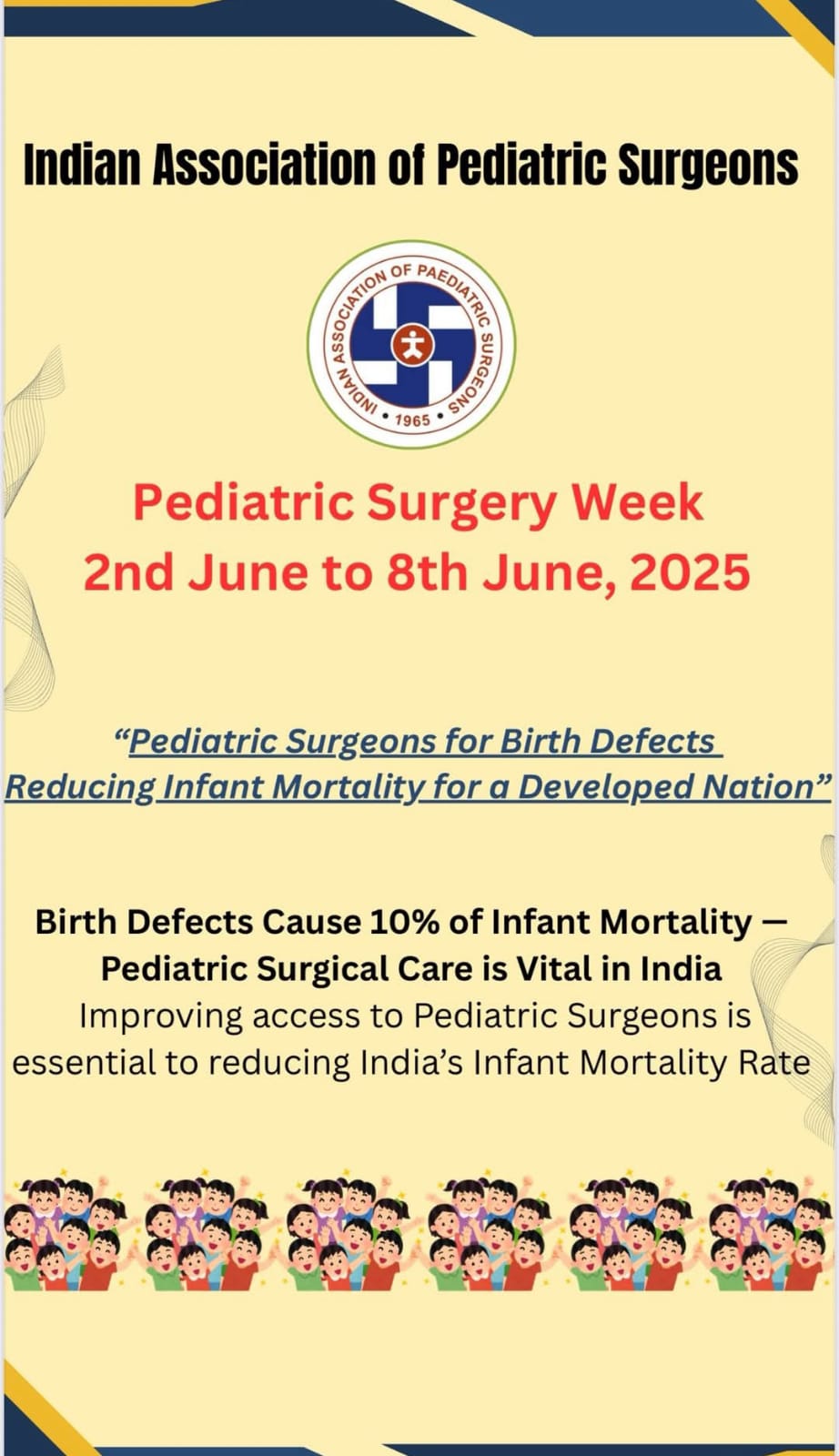
Pediatric Surgery Week
Every year, the first week of June is observed as Pediatric Surgery Week, a time dedicated to increasing awareness about the specialized surgical care that children require. Despite advancements in medicine and public health, there is still limited awareness about who pediatric surgeons are and what exactly they do — even among healthcare professionals.
Recently, during a routine consultation, a nurse from a medical college hospital visited with her infant. She candidly admitted she wasn’t sure what a pediatric surgeon actually does. This prompted me to write this article, with the aim of educating parents, caregivers, and the general public.
Who Are Pediatric Surgeons?
Pediatric surgeons are specialists trained to manage surgical conditions in children — from the newborn period through adolescence (0 to 18 years). Their role is not limited to performing surgeries. In fact, they are involved at every stage of a child’s surgical journey — including:
- Evaluating and diagnosing conditions that may or may not require surgery
- Providing counseling to parents during antenatal (ANC) scans when abnormalities are detected before birth
- Planning and managing postnatal surgical care for newborns with congenital anomalies
- Monitoring and managing surgical conditions in infants, children, and teenagers
Pediatric surgeons are trained to understand the physiological, anatomical, and emotional differences in children, which makes them uniquely qualified to handle their surgical needs.
Qualifications and Training
Becoming a pediatric surgeon requires extensive training and years of dedication. The journey includes:
- MBBS (Bachelor of Medicine and Bachelor of Surgery) – 5.5 years
- Internship – 1 year
- MS in General Surgery – 3 years (Postgraduate specialization)
- M.Ch in Pediatric Surgery – 3 years (Super-specialization)
In total, it takes about 14 to 15 years of education and clinical training after higher secondary school (HSC) to become a fully qualified pediatric surgeon.
Many pediatric surgeons further pursue fellowships in subspecialties such as:
- Minimal Access (Laparoscopic) Pediatric Surgery
- Pediatric Urology
- Pediatric Oncology
- Neonatal Surgery, and more
This level of specialization ensures that children receive care that is both technically advanced and age-appropriate.
What Do Pediatric Surgeons Treat?
Pediatric surgeons manage a wide spectrum of conditions, ranging from common surgical issues to rare and complex congenital anomalies. Their work includes both surgical intervention and clinical decision-making about when surgery is or isn’t necessary.
Neonatal Surgical Conditions:
- Tracheoesophageal Fistula (TEF)
- Congenital Diaphragmatic Hernia (CDH)
- Omphaloceles and Gastroschisis
- Intestinal Atresias
- Abdominal cysts and tumors
- Anorectal Malformations (ARM)
- Hirschsprung’s Disease
- Hydronephrosis, Hypospadias, and other urogenital anomalies
- Myelomeningocele (MMC)
Pediatric and Adolescent Conditions:
- Appendicitis and intestinal obstruction
- Constipation and chronic abdominal pain
- Hernias and hydroceles
- Trauma and burn injuries
- Foreign body ingestion or aspiration
- Pediatric solid tumors
- Urinary Tract Infections (UTIs) with structural anomalies
- Abscesses, skin infections, and soft tissue swellings
Importantly, pediatric surgeons assess whether a condition requires immediate intervention, medical management, or can be observed over time — avoiding unnecessary surgeries whenever possible.
Why Choose a Pediatric Surgeon Over a General Surgeon?
There is a common misconception that any surgeon can operate on a child. However, the anatomy, physiology, and emotional needs of a child are significantly different from those of an adult.
“A child is not a miniature adult.”
This is why pediatricians manage medical issues in children — and similarly, pediatric surgeons are the right experts for any surgical concerns.
Inappropriate or delayed referrals to a general surgeon may not only increase the risk of complications but may also impact the long-term physical and psychological outcomes of the child.
Conclusion
Pediatric Surgery Week is an opportunity to recognize the crucial role pediatric surgeons play in safeguarding children’s health. Parents, caregivers, and medical professionals must be aware of the importance of referring surgical issues in children to the right specialists.
Early and accurate intervention by a pediatric surgeon can make a significant difference in a child’s recovery and quality of life.
Dr. Kshama Kulkarni
M.Ch Pediatric Surgery (Gold Medalist)
Senior Consultant Pediatric Surgeon